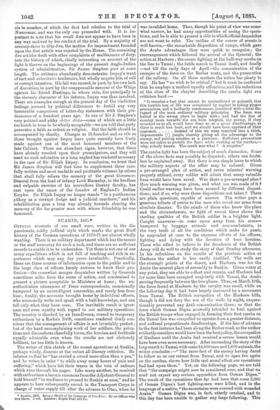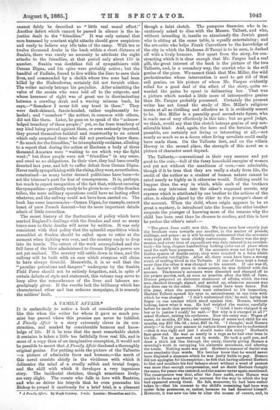SUAKrN, 1885.* Ossacna. accounts of our small wars, written in
the dis- passionate, coldly judicial style which marks the great Staff history of the German operations of 1870-71 are almost wholly wanting. There is no military department which has the means or the staff necessary for such a task, and there are no sufficient records to enable it to be undertaken. Yet there is not one of our many expeditions which is not full of teaching and rich in ex- periences which may any day prove invaluable. Practically, there are three sources of information open to the public and to the large class of officers keenly anxious to know their pro- fession—the somewhat meagre despatches written by Generals sometimes miles from the scene of action, and constrained to present a picture acceptable to Ministers at home ; the un- authoritative utterances of Press correspondents, occasionally hampered by an unintelligent censorship, and rarely free from bias ; finally, the accounts brought home by individual officers, who necessarily write and speak with a half-knowledge, and can tell only what they have seen. The inevitable result is ignor- ance and even apathy with regard to our military operations. The country is shocked by an Isandlwana, roused to temporary enthusiasm by a Rorke's Drift, sometimes rendered dimly con- scious that the management of affairs is not invariably perfect; but of the hard uncomplaining work of her soldiers, the priva- tions and discomforts cheerfully borne, the heroism and fortitude equally admirable even when the results are not obviously brilliant, far too little is known.
The writer of this sketch of the recent operations at Suakin, perhaps wisely, disarms at the outset all literary criticism. He informs us that he "has carried a sword more often than a pen," and he writes in order "to while away many hours of pain and suffering," which have left their traces in the vein of sadness which runs through his pages. Like many another, he received with enthusiasm a laconic summons from the Adjutant-General to hold himself "in readiness to proceed to Suakin at once," and he appears to have subsequently served in the Transport Corps in charge of water supply till after the advance to Otao, when he
• Suakin, 1885. Being a Sketch of the Campaign of this Year. By an Officer who was there. 1 vol. London : Regan Paul and Co.
was invalided home. Thus, though his point of view was some- what narrow, he had many opportunities of seeing the opera- tions, and he is able to present a side to which official despatches are not wont to refer. The outline of the course of events is well known,—the remarkable disposition of camps, which gave the Arabs advantages they were quick to recognise ; the rearrangement which followed the arrival of the General; the action at Hasheen; the severe fighting at the half-way zareba on the line to Tamai ; the futile march to Tamai itself, and finally —not till the early days of April—the concentration of the energies of the force on the Berber route, and the prosecution of the railway. On all these matters the writer has plenty to say. He has "no wish to be critical ;" but it must be confessed that he employs a method equally efficacious, and his reflections at the close of the chapter describing the zareba fight run criticism hard :—
"It remains a fact that cannot be contradicted or gainsaid, that this terrible loss of life was occasioned by neglect in taking proper precautions, and a foolhardy carelessness, combined with a total dis- regard of the most ordinary military principles. The force was halted in the wrong place to begin with ; and had the line of country more towards the sea been adopted, the enemy, if they. attacked us at all, would have done so at a great disadvantage, as there is much less bush, and we should have been apprised of their
approach Instead of this we were marched into a thick, impenetrable [i] jungle, thereby giving all the advantage to the enemy, and putting surprise at a premium. Sufficient precautions were not taken to protect the force while working at the zarebas,— why, nobody knows. The result was what ? A surprise."
The zareba fight has been the subject of much discussion. Some of the above facts may possibly be disputed; others can doubt- less be explained away. But there is one simple issue to which the military aspects of the affair may be reduced. Given a pre-arranged plan of action, and seven minutes' warning properly utilised, every soldier will admit that many valuable lives would have been saved. Was there a pre-arranged plan ?
How much warning was given, and what use was made of it P Could earlier warning have been secured by different disposi- tions; and if so, why were those dispositions not taken ? These are plain questions, capable of answer. The writer pays a generous tribute of praise to the men who saved our arms from absolute disaster. To the minds of those who know the place and the circumstances, no fight of recent times shows the sterling qualities of the British soldier in a brighter light.
Caught unawares—in some cases away from his arms— hampered by baggage animals and non-combatants, in the very teeth of all the conditions which make for panic, he responded at once to the supreme efforts of his officers, fighting and dying with the devotion of true heroism.
Those who affect to believe in the decadence of the British Army will do well to study the story of that Sunday afternoon.
In his reflections on the results of the previous action at Hasheen the author is less easily justified. The wells are the strategic points of the desert, and Hasheen was for the Arabs the nearest place of assembly to Suakin. Given water at any point, they are able to collect and remain, and Hasheen had for some time been occupied conjointly with Tamai, the Arabs moving frequently between the two places. Thus, on March 1901, the force found at Hasheen by the cavalry was small, while on.
the following day it had been largely increased by a movement from Tamai. The British occupation of the Hasheen hills,
though it did not deny the use of the wells by night, unques- tionably prevented any Arab concentration there ; so that the force which Osman Digna avowedly intended to hurl against the British troops when engaged in forming their first zareba on the Tamai line was compelled to operate from a greater distance, and suffered proportionate disadvantage. If the line of advance in the first instance had been along the Berber road, as the author evidently considers would have been the best policy, the occupation of Hasheen until the Arabs had received a severe lesson would have been even more necessary. After recounting the story of the long march to Tamai, with some 12,000 men and 1,800 animals, the writer concludes :—" The mere fact of the enemy having dared to follow us on our retreat from Tamai, and to open fire again on the zarebas, shows how little real moral effect our operations had had upon them." Yet, on the following page, we are told that "the campaign might now be considered over, and that we need not expect any serious opposition from Osman Digna."
The result of the operations thus far had been that some 3,000 of Osman Digna's best fighting-men were killed, and in the language of a native, "the mountains were covered with wounded Arabs." Osman Digna was, in fact, utterly crushed, and to this day has been unable to gather any large following. This
cannot fairly be described as "little real moral effect." Another defect which cannot be passed in silence is the in- justice dealt to the "friendlies." It was only natural that men harassed by constant night attacks should grow suspicions and ready to believe any idle tales of the camp. With ten or twelve thousand Arabs in the bush within a short distance of Suakin, there was surely no necessity to attribute the night attacks to the friendlies, at that period only about 170 in number. Suakin was doubtless full of sympathisers with Osman Digna, and his spies were probably active ; but the handful of Fadlabs, forced to live within the lines to save their lives, and commanded by a sheikh whose two sons had been killed by the Hadendowas, certainly did not furnish either. The writer naïvely betrays his prejudice. After admitting the value of the scouts who were told off to the outposts, and whose keenness of sight was of great use in discriminating between a crawling Arab and a waving mimosa bush, he says,—" Somehow I never felt any trust in them." They were dark-skinned, fazzie-headed, rather unpleasantly be- larded; and "somehow" the author, in common with others, did not like them. Late; he goes on to speak of the "acknow- ledged treachery of these people ;" yet, so far from treachery of any kind being proved against them, or even seriously imputed, they proved themselves faithful and trustworthy to an extent which only surprised those who did not previously know them. "So ranch for the friendlies," he triumphantly exclaims, alluding to a report that during the action at Hasheen a body of three thousand Amarars were "waiting to see which way the fight went ;" but these people were not " friendlies " in any sense, and owed us no obligations. In their view, they had been cruelly deserted last year, and left to suffer defeat from Osman Digna. Never really sympathising with the rising, they were, nevertheless, constrained—as many better dressed politicians have been—to act the trimmer's part for fear of consequences. It is, perhaps, too much to expect recognition of the fact that, without securing the sympathies—perfectly ready to be given to us—of the Soudan tribes, the mere military operations could have no lasting effect whatever, and the railway could not have been carried on. The book has some inaccuracies—Osman Digna, for example, cannot boast of pure French descent—but its more important details admit of little correction.
The secret history of the fluctuations of policy which have marked England's dealings with the Soudan and sent so many brave men to their deaths will never be written. It was only consistent with that policy that the splendid expedition which assembled at Suakin should be called upon to retire at the moment when fighting was over, and the country ready to drop into its hands. The extent of the work accomplished and the full force of the blow administered to Osman Digna's power are not yet realised. The country will settle down in time, and the railway will be built with an ease which everyone will claim to have always foretold. Meanwhile, it is as well that the "peculiar privations and dangers" undergone by the Suakin Field Force should not be entirely forgotten, and, in spite of certain defects of style and statement, this volume may serve to keep alive the remembrance of the lives and labours un- grudgingly given. If the results lack the brilliancy which has characterised other and less arduous campaigns, it is scarcely the soldiers' fault.



































 Previous page
Previous page